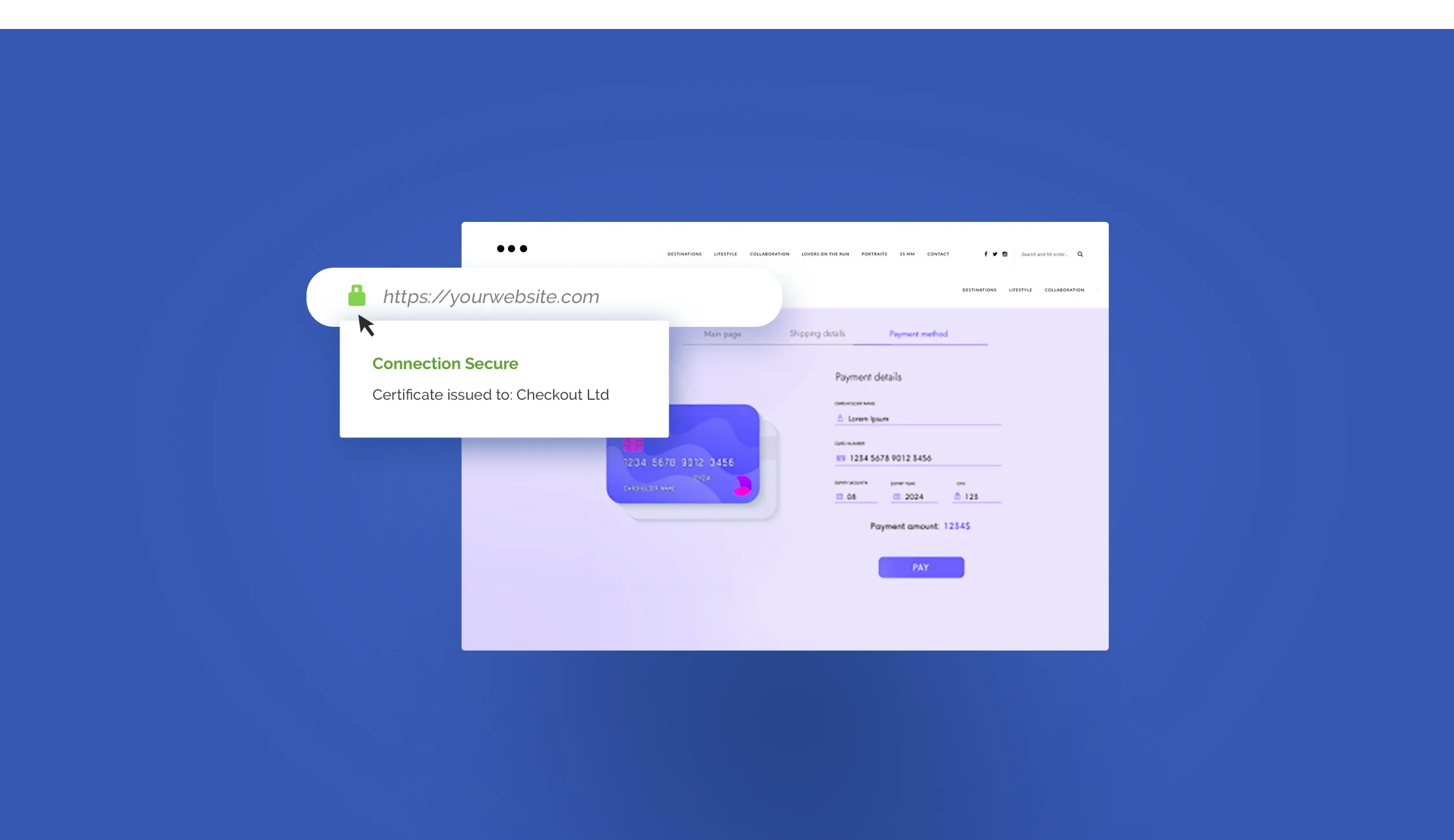SSL CERTIFICATES
Gain the trust of your
visitors.

Boost Google
search rankings.
Boost your site’s Google search ranking with an SSL certificate from C‑DR. Google has confirmed they give precedence to a site with a secure connection … and it makes sense.

30-day money-back guarantee.
Love your SSL or your money back!

Gain the trust of
your customers.
Potential customers are less likely to buy from a website without a lock in the address bar than from one with that lock.

Choose the right SSL. For you.
If you’re looking to buy an SSL Certificate, then you already know it establishes a secure connection between your customers and your site. All data sent and received is encrypted, ensuring all private details remain private.
Buying your SSL certificate from C-DR not only gets you protection at a cheap price, the level of security and encryption is often higher quality than you will find through more expensive suppliers. All SSL certificates include:
- SHA-2 & 2048-bit encryption.
- Boost SEO rankings
- Display HTTPS & padlock
- Security trust seal
- Support unlimited servers
- Free unlimited reissues
Domain SSL (1-Site)
- Protect 1 domain
- Domain validation
- Issuance in 5 min
Domain SSL (5-Site)
- Protect 5 domains or subdomains
- Domain validation
- Issuance in 5 min
Wildcard SSL (1-Site)
- Protect unlimited subdomains
- Domain validation
- Issuance in 5 min
EV SSL (1-Site)
- Protect 1 domain
- Extended validation
- Issuance in 3-5 days
EV SSL (5-Site)
- Protect 5 domains or subdomains
- Extended validation
- Issuance in 3-5 days
Managed Domain SSL (1-site)
- Protect 1 domain
- Domain validation
- Issuance in 5 min
- Automated installation and ongoing maintenance.
Managed Domain SSL (5-site)
- Protect 5 domains or subdomains
- Domain validation
- Issuance in 5 min
- Automated installation and ongoing maintenance.
SSL Certificate comparison.
| Domain SSL (1-Site) | Domain SSL (5-Site) | Wildcard SSL (1-Site) | EV SSL (1-Site) |
EV SSL (5-Site) |
Managed Domain SSL (1-site) | Managed Domain SSL (5-site) | |
|---|---|---|---|---|---|---|---|
| Boost search rankings | |||||||
| Display HTTPS & padlock | |||||||
| Number of domains protected | 1 | 5 | Unlimited subdomains | 1 | 5 | 1 | 5 |
| Time to issue | 5 mins | 5 mins | 5 mins | 3-5 days | 3-5 days | 5 mins | 5 mins |
| Validation type | Domain | Domain | Domain | Extended | Extended | Domain | Domain |
| Warranty | $100,000 | $100,000 | $100,000 | $1,000,000 | $1,000,000 | $100,000 | $100,000 |
| Installation and maintenance | Self | Self | Self | Self | Self | Manged | Manged |
We’re here to help.
Our support is the best in the industry. C-DR won’t waste your time with endless email conversations or inferior offshore support. Call our US-based Guides anytime to help you with purchasing advice or technical support.
FAQ
Are SSL certificates permanent?
No, you’ll have to renew after a set amount of time (usually 1 year).
When it comes time to renew, you’ll be able to manage all your SSL certificates from your account page.
Check out our detailed renewal guide for more information.
Why would I need to have my SSL certificate reissued?
You’ll need to reissue your SSL certificate if:
- You change your hosting service
- You change your domain name for which the SSL was issued
- You believe your CSR/ RSA pair has been compromised
- You changed the contact details of the certificate
There’s no cost to reissue your SSL certificate. Follow this detailed guide for step-by-step instructions.
How do I renew an SSL certificate?
Follow our guide for step-by-step instructions.
I have a question that wasn’t covered here. Where can I find an answer?
Just call us at (480) 624-2500 and we’ll answer any questions you may have, 24/7.
SSL Certificate buyer’s guide.
Standard, Premium? DVs, EVs? Wildcard?
Picking out the package that’s right for you can seem daunting at first, but really it just comes down to a few simple questions. In this guide, you’ll learn what an SSL Certificate says about your website and how to pick the right one for you.
What Your Certificate Says About Your Website
When someone visits your website your first order of business is making them feel secure, like they can trust you. The lockpad icon at the top of the browser bar immediately lets them know they can trust your site, because you’ve been verified.
In fact, most browsers are basically requiring that a website has an SSL Certificate, or else they flash a “Not Secure” warning at the top of the address bar, a surefire way to scare visitors away.
All three of our Standard SSL certificates give your website a Domain Validated (DV) Certificate, letting users know that you are who you say you are.
However, if you really want to go the extra mile in customer reassurance, you might think about the Premium SSL packages, which include an Extended Validation (EV) Certificate.
An Extended Validation Certificate shows up differently in your visitor’s browser. Instead of just seeing a lockpad, they’ll also see the name of your business and the country it’s based out of.
However, there are more hoops to jump through in attaining this certification, which can require a letter from a CPA or a legal opinion letter verifying a government organization, to name a couple.
Additionally, if you go to other SSL Registry websites, they’ll tell you that an EV will make the browser address bar turn green, really catching the visitor’s eye. But that’s just not true anymore. While certain browsers will still feature a green lockpad, Chrome has no color differentiation, and it’s not the only one. Also, your general customer just doesn’t know what that green bar means.
The fact is, most websites, including Facebook, Amazon, and Reddit, opt for a regular DV. In fact, so do we.
If part of your business’s main selling point is that you’re the most credible, trustworthy business around, you may want to think about an EV. Otherwise, a regular DV will allow you to purchase an SSL cheap while still giving you all the great benefits.
We have a lot more information about SSL Certificates in our Website Security Guide.
Choosing an SSL certificate
This is a simple question to answer, but there is a little nuance to it. If you need to protect between 2-5 websites, go with our 5-site Standard or Premium Packages (deciding between the 2 comes down to if you want DV or EV). See? Easy.
But if you need to protect just one site, don’t rush to pick the 1-site certificate yet. You may need the wildcard certificate.
Why Would I Need the WildCard Package?
Simple, if your website has subdomains, you’ll need the wildcard certificate, as it’s the only one that covers all subdomains.
What’s a subdomain? Well, for an in-depth guide, check out our Domain Names 101 tutorial.
But if you want a quick rundown, think of it like this:
Domains go right to left. The Top Level Domain (TLD) is what you see on the right, the .com, .org, .net, etc.
The second level domain comes next. It’s the “Cheap-DomainRegistration” in Cheap-DomainRegistration.com. And the www. is the subdomain.
But there are other subdomains your site can have. If you have an online store on your website, you’ll probably have a page with the address store.mywebsite.com.
Or, if you have a tourism website, a page on your website might read visit.myvacation.com.
On those pages, the subdomains are “store” and “visit”.
So, does your website have multiple subdomains? If so, you’ll need the wildcard SSL certificate.
If not, you’ll need either of the 1-site Standard or Premium SSL packages, depending on if you want a DV or EV.
That’s it! That’s all you need to know when it comes to choosing a SSL Package!
